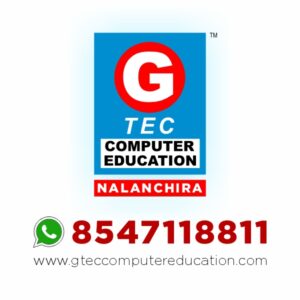CERTIFICATE COURSE IN PROGRAMMING IN C
Duration : 2 Months / 72 Hours
OBJECTIVE
PROC24 – GN8850-9600F
A course designed for a novice in the field of programming, gives you a first easy step to enter into the world of programming through the most popular, most loved C Programming.
COURSE OUTLINE
BASICS OF PROGRAMMING AND HISTORY OF C 👈🏽
- Define software, the components of a programming software (editor, debugger, compiler, interpreter, linker etc.)
- Algorithm, pseudo codes, flow chart.
- Programming models- procedure oriented and object oriented and the difference.
- The history of c.
- Standard c libraries and the first c program.
- The life cycle and adding comments to a program.
DATA TYPES AND VARIABLES 👈🏽
- Define data types, data type classification- integral and floating
- Data types and their max values
- Variables/ identifiers, variable declaration and its syntax
- Variable arguments
- Assigning values to a variable
- Adding comments
- Display variable values with printf(), reading variable values with scanf()
- Define format specifies (%f, %d, %s)
- Formatting output
- Data type qualifiers (short, long, unsigned etc)
- External variables (use of extern keyword) and its usage
- Static variables
- Register variables and volatile variables
- Converting data types
- Arrays and multi-dimensional arrays.
CONSTANTS AND OPERATORS 👈🏽
- Declaring constants and define its use
- Enumerating constants using the enum keyword, Typedef
- Using # define and conditional definition.
- Performing operations using operators- arithmetic operators (+,-,*,/,%,++,–)
- Logical operators (and, or, not)
- Assignment operators (=,+=,-=,*=,/=,%=)
- Comparison operator (==, !=, <,>, >=,<=)
- Conditional operator (?:)
- Size of operator and operator precedence.
CONTROL STRUCTURES AND FUNCTIONS 👈🏽
- Control structures- branching (if, if else, switch) syntax and usage,
- Looping (for, while and do while) with the detailed syntax and context of usage,
- The break and continue statement, goto statement.
- Functions- define what a function is, function declaration with its syntax, function
- arguments, calling functions and recursive functions, function in custom headers, multiple
- source files and static functions.
- Some important built-in math, string and character functions.
- Header files.
POINTERS AND COMMAND LINE ARGUMENTS 👈🏽
- Introduce pointers
- Pointing to a variable
- Pointer data ypes, getting and setting values using pointers, pointer arithmetic, pointers and arrays
- Changing variable values with pointers
- Passing pointers to functions
- Array of pointers and pointing to functions.
- Creating command line argument program in c
- The argc and argv arguments
- Build and make a c program
- Passing arguments through command line.
STRUCTURE, LINKED LIST, FILE HANDLING AND BASIC GRAPHICS 👈🏽
- Define structure and its use,
- Declaring a structure,
- Creating instances of a structure,
- Using typedef with structure, nesting of structures and its application,
- Accessing members of a structure,
- Arrays and pointers in structures,
- Structure pointer, collection of structures, structures as function argument,
- Unions and its difference with structures, declaring a union, array of unions, unions as
- member of structures and pointers to unions.
- Linked list- concept of linked list and dynamic memory allocation using malloc,
- Types of linked list single, doubly linked list, circular linked list), inserting, appending and
- deleting nodes in singly linked list, grounding the node and emptying the list.
- Explain the concept of dynamic memory allocation and write a program to create a singly
- linked list and do the basic operations such as insert a node, delete a node and empty the
- Demonstrate the implementation of doubly linked list, circular linked list and its basic
- File handling and Basic graphics
- Introduce the library for file operations and important functions in it.
- The FILE datatype, fopen(), fclose(), file pointers, fscanf(), fprintf(), fputs(), fgets(), fputc(),
- fgetc(), fread() and fwrite().
- Reading and writing files character wise and as a whole and reporting errors.
- Introduce graphics in C, text mode and graphics mode, graphics used in text mode-
- window(), cputs(), gotoxy();
- Graphics in graphics mode, INITGRAPH(), closegraph(), circle(), setcolor(), setlinestyle(),
- setfillstyle(), floodfill(), rectangle(), line();
- Text in graphics mode- outtext(), settextstyle()
EXIT PROFILE
Exit Profile 👈🏽
- Good computer knowledge.
- Program and solve problems using C
- Program in ide
- Develop simple desktop application
- Understand the POP concept
CAREER PATH
Career Path 👈🏽
- Programmer in C
- IT Educator
1 CERTIFICATE
★ G-TEC Certificate
APPLY / ENQUIRE NOW
You can also fill out our enquiry form and we will call you back.
Share
Facebook
WhatsApp
Email
